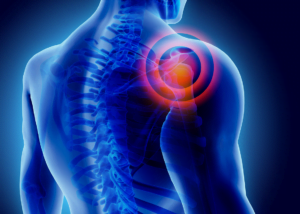Dealing with the discomfort of shoulder pain coupled with tingling fingers can significantly affect one’s quality of life. This article delves into the various aspects of this common issue, providing insights into its causes, relief measures, and prevention strategies. Whether you’re seeking quick at-home remedies or contemplating medical interventions, understanding the underlying factors is key to finding effective solutions.
Contents
Understanding Shoulder Pain and Tingling Fingers

Shoulder pain and tingling fingers can be related through nerve pathways and anatomical connections. Nerves that originate in the neck and shoulder area can transmit signals to various parts of the upper extremities, including the shoulder, arm, and fingers. When there is an issue affecting these nerves, it can lead to both shoulder pain and tingling sensations in the fingers. Here’s how the relationship between these symptoms works:
- Nerve Pathways: Nerves that start in the neck and run through the shoulder area, such as the brachial plexus, provide sensory and motor functions to the entire upper limb. These nerves send signals from the brain to the muscles and skin of the shoulder, arm, and fingers.
- Nerve Compression or Irritation: When these nerves are compressed, irritated, or impinged along their pathway, the signals can become disrupted. This disruption can lead to various symptoms, including pain, tingling, numbness, and weakness.
Common Causes of Shoulder Pain and Tingling Fingers
Shoulder pain and tingling fingers can result from various conditions, ranging from localized issues in the shoulder to nerve-related problems originating from other parts of the body. Here are some common causes:
- Pinched Nerve (Brachial Plexus Compression): The brachial plexus is a network of nerves that controls the arm and hand. Compression or irritation of these nerves, often due to poor posture, trauma, or muscle imbalances, can lead to shoulder pain and tingling in the fingers.
- Rotator Cuff Injuries: The rotator cuff is a group of muscles and tendons that stabilize the shoulder joint. Injuries such as strains, tears, or inflammation can cause pain in the shoulder that may also radiate down the arm, leading to tingling sensations in the fingers.
- Cervical Herniated Disc: A herniated disc in the neck can press on spinal nerves, causing pain to radiate from the neck and shoulder down the arm. This can result in tingling, numbness, or weakness in the fingers.
- Carpal Tunnel Syndrome: While primarily associated with wrist and hand symptoms, carpal tunnel syndrome can cause referred pain in the forearm and shoulder. Pressure on the median nerve can lead to tingling sensations and discomfort in the fingers.
- Thoracic Outlet Syndrome: This condition involves compression of nerves or blood vessels between the collarbone and the first rib. It can lead to pain in the shoulder, neck, and arm, as well as tingling in the fingers due to nerve compression.
- Nerve Impingement or Entrapment: Nerves traveling through the shoulder area can become compressed or impinged, causing pain and tingling. Conditions like suprascapular nerve entrapment or axillary nerve compression can be responsible.
- Frozen Shoulder (Adhesive Capsulitis): This condition involves stiffness and pain in the shoulder joint, limiting its range of motion. The pain can radiate down the arm, potentially causing tingling in the fingers due to nerve irritation.
- Heart-Related Issues: In some cases, shoulder pain can be a referred symptom of heart-related problems, such as angina or a heart attack. This can cause pain that radiates to the shoulder and down the arm, accompanied by tingling sensations.
- Peripheral Neuropathy: Nerve damage, often caused by conditions like diabetes or vitamin deficiencies, can lead to symptoms like tingling, numbness, and pain in various parts of the body, including the fingers and shoulder.
Seeking Relief: Home Remedies and Lifestyle Changes

While it’s important to consult a healthcare professional for a proper diagnosis and treatment plan, there are some home remedies and lifestyle changes that may help alleviate shoulder pain and tingling fingers. These suggestions can provide temporary relief and complement any medical treatment you might be receiving:
Rest and Posture Improvement:
- Avoid activities that worsen your symptoms and give your shoulder and arm adequate rest.
- Practice good posture to reduce strain on your neck, shoulder, and back muscles.
Warm or Cold Compress:
- Apply a warm compress to the affected shoulder to relax muscles and improve blood flow.
- For acute pain or inflammation, use a cold compress to reduce swelling and numb the area.
Gentle Stretches and Exercises:
- Perform gentle stretches and range-of-motion exercises to maintain shoulder flexibility.
- Strengthening exercises prescribed by a physical therapist can help stabilize the shoulder joint and improve posture.
Over-the-Counter Pain Relievers:
- Non-prescription pain relievers like ibuprofen or naproxen can help manage pain and reduce inflammation. Always follow the recommended dosage and consult a doctor if you have any medical conditions or are taking other medications.
Ergonomic Changes
- Adjust your workspace and seating to promote good posture, especially if you work on a computer or spend long hours at a desk.
Massage and Self-Care
- Gentle massage of the shoulder and neck area can help relax muscles and relieve tension.
- Practice relaxation techniques such as deep breathing, meditation, or yoga to reduce stress and muscle tension.
Hot Showers or Baths:
- Warm water can help relax muscles and provide temporary relief from pain and discomfort.
Supportive Pillows:
- Use supportive pillows while sleeping to maintain proper neck and shoulder alignment.
When to Consult a Medical Professional
It’s important to consult a medical professional if you’re experiencing shoulder pain and tingling fingers. This is especially true if the symptoms are persistent, worsening, or accompanied by other concerning signs. Here are some situations in which you should seek medical attention:
- Severe Pain: If you’re experiencing intense or severe shoulder pain that interferes with your daily activities and doesn’t improve with rest or over-the-counter pain relievers.
- Numbness or Weakness: If you have numbness, weakness, or loss of sensation in your fingers or hand, especially if it’s on one side of your body.
- Radiating Pain: If the pain from your shoulder travels down your arm and is accompanied by tingling, numbness, or weakness in your fingers.
- Pain with Heart Symptoms: If you’re experiencing shoulder pain that is also accompanied by symptoms such as chest pain, shortness of breath, dizziness, or nausea. These could be signs of a heart-related issue and require immediate medical attention.
- Persistent Symptoms: If your shoulder pain and tingling fingers persist for more than a few days or weeks. If the symptoms are not severe, it’s a good idea to consult a healthcare provider for a proper evaluation.
- Recent Injury: If your symptoms began after a fall, accident, or other injury to the neck, shoulder, or upper arm.
- Limited Range of Motion: If you notice a significant decrease in your shoulder’s range of motion, or if the pain and tingling are preventing you from moving your arm normally.
- History of Health Conditions: If you have a history of conditions like diabetes, heart disease, or autoimmune disorders, as these can increase your risk of nerve-related issues.
In any of these situations, it’s better to err on the side of caution and consult a medical professional. They can conduct a thorough examination, review your medical history, and potentially order diagnostic tests to determine the underlying cause of your symptoms. Early intervention can lead to quicker relief and prevent potential complications.
Medications For Shoulder Pain and Tingling Fingers

Medications can be a part of the treatment plan to manage shoulder pain and tingling fingers, but they should be used under the guidance of a healthcare professional. The choice of medication will depend on the underlying cause of the symptoms and any other medical conditions you may have. Here are some types of medications that might be prescribed:
Over-the-Counter Pain Relievers (Nonsteroidal Anti-Inflammatory Drugs – NSAIDs):
- Examples: Ibuprofen, naproxen
- How they work: NSAIDs help reduce pain and inflammation by blocking certain enzymes in the body.
- Caution: These medications can have side effects such as stomach irritation and can interact with other medications. Long-term use should be discussed with a healthcare provider.
Prescription Pain Relievers:
- If over-the-counter NSAIDs are not providing adequate pain relief, your doctor might prescribe stronger pain medications. These should be used under close medical supervision due to the potential for side effects and dependency.
Muscle Relaxants:
- Examples: Cyclobenzaprine, methocarbamol
- How they work: Muscle relaxants can help relieve muscle spasms and reduce tension in the affected area. This can contribute to pain relief.
Topical Analgesics:
- Examples: Topical creams or patches containing lidocaine or capsaicin
- How they work: These products can provide localized pain relief by numbing the area or affecting nerve receptors in the skin.
Nerve Pain Medications (Neuropathic Agents)
- Examples: Gabapentin, pregabalin
- How they work: These medications are used to address nerve-related pain. They can be effective for conditions that involve nerve compression or irritation.
Understanding Surgical Interventions
Surgical interventions for shoulder pain and tingling fingers are considered when conservative treatments, such as rest, physical therapy, medications, and lifestyle changes, have not provided sufficient relief or when there’s an underlying structural issue that requires correction.
Surgery is generally considered a last resort and is recommended when the benefits outweigh the potential risks and recovery process. The specific type of surgery will depend on the underlying cause of your symptoms. Here are some common surgical interventions:
Rotator Cuff Repair:
- If you have a torn rotator cuff that is causing pain and limited range of motion, surgery may be recommended to repair the torn tendon. This can involve arthroscopic or open surgery, depending on the extent of the tear.
Shoulder Arthroscopy:
- Arthroscopy is a minimally invasive procedure where a small camera (arthroscope) is inserted through tiny incisions to visualize and treat various shoulder conditions, such as rotator cuff tears, labral tears, and shoulder impingement.
Shoulder Replacement Surgery:
- If you have severe shoulder arthritis or other degenerative conditions, your doctor might recommend shoulder replacement surgery. This involves replacing the damaged parts of the shoulder joint with artificial components.
Conclusion
Shoulder pain accompanied by tingling fingers is a challenging issue, but with the right approach, it’s manageable. From simple lifestyle changes to medical treatments, the path to relief and prevention lies in understanding the causes and taking proactive steps.
If you’re experiencing Shoulder pain, physical therapy for shoulder pain at PhysioMantra can help: Book an online physical therapy session.



